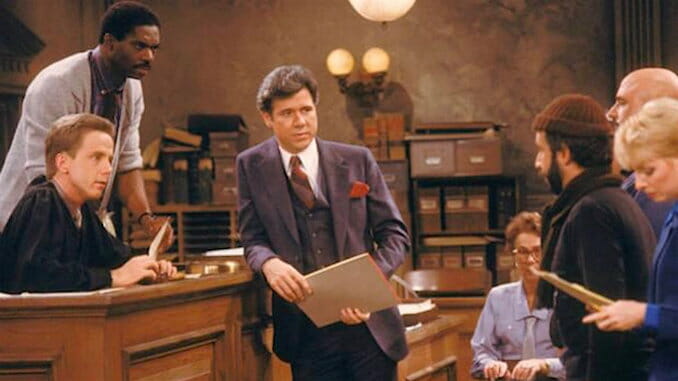TV Rewind: Night Court and the Theater of the Truly Absurd
Photo Courtesy of NBC
Editor’s Note: Welcome to our TV Rewind column! The Paste writers are diving into the streaming catalogue to discuss some of our favorite classic series as well as great shows we’re watching for the first time. Come relive your TV past with us, or discover what should be your next binge watch below:
![]()
Litigation may not seem like the most humorous backdrop for a sitcom, but back in the 1980s, chaos and disorder in the courtroom were comedy gold.
Airing from 1984 to 1992 on NBC, Night Court presented a look into the bizarre Manhattan courtroom of Judge Harry T. Stone (Harry Anderson), a youthful magic enthusiast who admired 1940s culture, and who presided over cases involving what one episode quipped were the “dregs of society,” night after night.
While sex workers, flashers, and petty criminals don’t exactly convey elements worthy of a laugh riot, the superb writing, hilariously unfathomable plotlines, and the motley crew of characters gave Night Court its panache—although it would take several years and cast changes to get there.
In addition to Stone, the first season’s cohorts included court clerk Lana Wagner (Karen Austin), public defender Liz Williams (Paula Kelly), bailiffs Selma Hacker (Selma Diamond) and Bull Shannon (Richard Moll), and prosecutor Dan Fielding (John Larroquette). As the series progressed, the premise and laughs were starting to pick up steam. Through various recasts, the show began to find its niche in the second season. Charles Robinson would replace Austin as the sweater-loving, mild-mannered Macintosh “Mac” Robinson, and Ellen Foley stepped in as new public defender Billie Young. After Selma Diamond’s death in 1985 from cancer, character actress Florence Halop replaced her as the equally petite and acerbic Florence Kleiner.
This revolving door of supporting cast members would continue, however, viewers got a brief introduction to the show’s eventual permanent defense attorney when Markie Post guest-starred in the Season 2 episode “Daddy for the Defense.” Post’s first foray as the naïve and conservative Christine Sullivan would strike a chord with viewers, and once her role in the Lee Majors action program The Fall Guy ended, Post officially joined the cast and remained until the series’ end. Then, after Halop’s death in 1986 (also from cancer), the back-to-back loss of two bailiffs would be colloquially referred to as the “Night Court Curse” The significantly younger Marsha Warfield would be picked up as Roz Russell, a new bailiff who was just as balls-to-the-wall and vocal as her predecessors.
Ask anyone with even a remote familiarity with the show, and they will stress that Night Court ’s breakout character was definitely Dan Fielding. Originally presented as a pompous, pretentious snob, Larroquette would transform him into the kind of man not typical of a TV star: lecherous, womanizing, often unscrupulous, and a borderline deviant. While Dan could very well be considered a precursor to How I Met Your Mother’s resident player Barney Stinson, the character was undeniably scummy. Through his impeccable comedic interpretation, Larroquette added a vulnerability and heart that made the character loveable (despite being a sleaze), earning him four consecutive Primetime Emmy awards for Outstanding Supporting Actor in a Comedy Series.
Once the cast was perfected, they bounced off of one another wonderfully, with a symmetry and synergy that has been almost impossible to replicate. In truth, there are only a handful of shows that contain the same level of chemistry and rapport as this cast does.
Created by the late Reinhold Weege, who had also written for ‘70s cop comedy Barney Miller and M*A*S*H, Night Court used plenty of wit, sight gags, a bit of slapstick, and (at times) insults, raunchiness, and gross-out humor to bring joviality into judicial tedium and mundanity. While Harry and Christine’s underlying romantic tension would remain just below the surface throughout the seasons, many of the storylines can be viewed as completely implausible (four pregnant women go into labor at the same time after a hurricane traps everyone in the court building), coincidental (three elderly ladies running a phone sex line recognize Dan, and by association, Christine), or downright strange (a disturbed man claims he’s from the planet Saturn and holds the crew hostage).
Part of NBC’s consistently strong primetime programming block, which during its run included Cheers, The Cosby Show, A Different World, Family Ties, Hill Street Blues, and L.A. Law, Night Court was the odd duck among its peers. Let’s be clear, the show was quite weird. No judge in real life would pull out magic tricks during a session, no attorney would ever be lascivious or outwardly insulting toward a litigant, and half the cases depicted were so outlandish that a suspension of disbelief was guaranteed. It was lightning in a bottle and I loved every minute of it.